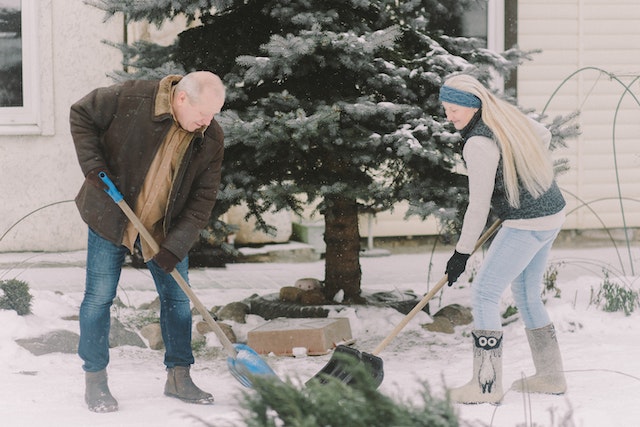Guide To Life Insurance Policies, Types & Quotes
February 4, 2023Home Renovation Insurance
February 9, 2023Winter Home Insurance Claims & How to Avoid Them
Winter damage to your home may frequently be avoided. When you can't, your house insurance might come in handy.

Table Of Contents
1.Water pipe bursts
2.Roof ice dams
3.Fallen tree branches
4.House fires
Understand your insurance limitations and exclusions.
Winter weather, whether it's freezing temps or a blackout storm, can wreak havoc on a property. However, by taking simple precautions, you can avoid a calamity.
Here are four frequent sorts of winter-related house damage and how to avoid them, as well as how home insurance works in the case you can't.
1. Broken Water Pipelines
A frozen water pipe might be the cause of your kitchen faucet not operating on a chilly winter morning. Frozen pipes can break, causing water damage that can be costly to fix.
Allow your faucets to trickle on the coldest days to protect pipe water from freezing and bursting. Cover pipes in locations exposed to the coldest temperatures, such as basements and attics, with sleeves or newspaper. If a pipe does freeze, turn off the water immediately and melt the frozen water using a hot pad or hair drier.
But don't be concerned if a pipe explodes. "Almost all [home] insurance plans will cover the following damage from a burst pipe," says Steve Wilson, Hippo Insurance's director of technical underwriting. After you pay your deductible, your home insurance will pay out up to the limits of your policy. Your dwelling coverage will pay for house repairs, whilst your personal property coverage will pay for damaged possessions.
Remember that in order for an unintentional water damage claim to be granted, homeowners must take actions to reduce the likelihood of it occurring, such as keeping the home's temperature at a minimum of 55 degrees during cold weather. If water damage occurs, homeowners must take measures to prevent future damage, such as shutting off the water valve.
2. The Roof Has Ice Dams.
When snow melts and refreezes near the gutters or roof edges, a "ice dam" forms on the roof. When the ice begins to thaw, water can seep beneath roof shingles, causing mould and leaking. And while the icicles that form on your roof may be beautiful, a big icicle might take a gutter off.
Your homes insurance would most certainly cover ice dam damage, but taking extra precautions might prevent it completely. Seal any points where warm air may seep up from your living spaces to ensure your attic is adequately insulated. This will keep your roof cool, preventing the formation of an ice dam.
Inspect your roof to determine whether solutions such as heat cables and rubberized shingles can prevent ice dams from forming in the first place. Keep all gutters clean of debris so that melting snow can drain correctly.
Do not attempt to scrape snow off your roof. This can cause shingle deterioration and weaken your roof over time.
3. Tree Branches That Have Fallen
Large tree branches that hang over a house might be dangerous in the winter. Ice weight can force limbs to snap and fall on houses or fences.
If an ice branch falls on your home, your dwelling coverage should cover the necessary repairs, while your other buildings coverage will cover items like a broken fence or shed./h5>
Trim your trees on a regular basis to prevent the problem entirely. In reality, an insurer may refuse a claim if it determines that the damage was caused by a lack of maintenance over time.
4. House Fires
As people burn candles and fireplaces, house fires are a significant source of winter insurance claims. These suggestions can aid in the prevention of unwanted fires.
•When the power is out, use flashlights instead than candles and switch off any electrical equipment.
•Keep Christmas trees watered to prevent them from drying out and becoming fire risks.
•Never heat your home using your cooking stove.
•Keep portable heaters at least 3 feet away from anything combustible and disconnect them before going to bed.
•Install a glass or metal screen in front of your fireplace and have it cleaned once a year by a professional chimney sweep
As long as the fire was not intentionally started, your house insurance will cover the damage. If you need to stay someplace else due to smoke or rebuilding, the loss of use coverage in your insurance policy can assist pay for hotel fees and additional living expenses. Keep all receipts in case your insurance requires proof of your spending.
Understand Your Insurance Limitations And Exclusions.
So you're prepared if tragedy hits, talk to your insurance agent or business about what your homes policy does and does not cover. You may also look at your insurer's home insurance declarations website for a list of what is covered and the exclusions part of your policy for anything that isn't.
Another item to double-check? Your personal property boundaries. Certain things, such as jewels or antiques, may have lower restrictions than others. If you have a lot of valuables, you may need more coverage.
